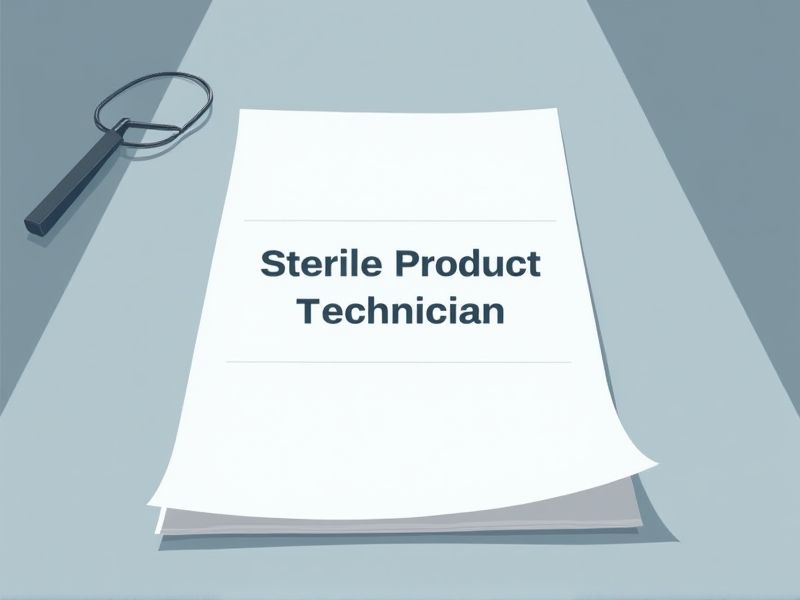
Sterile Product Technicians handle critical tasks that can directly impact patient safety and product efficacy. Certification ensures they meet the rigorous standards required to maintain a clean and safe production environment. Regulatory bodies demand specific certifications to ensure compliance with health and safety laws. Here are some important certifications you may need as a Sterile Product Technician.
Certified Registered Central Service Technician (CRCST)
A Certified Registered Central Service Technician (CRCST) ensures that healthcare facilities maintain high standards of infection control and patient safety. They provide expertise in sterilization techniques, which is critical to preventing the spread of infections in medical settings. With CRCST certification, sterile product technicians demonstrate a comprehensive understanding of equipment decontamination, contributing to more efficient healthcare operations. This certification directly improves the quality and reliability of sterile processing, leading to better overall patient outcomes.
Certified Instrument Specialist (CIS)
Being a Certified Instrument Specialist (CIS) enhances the sterile product technician's understanding of complex surgical instruments, reducing the risk of errors in instrument handling. CIS certification ensures thorough knowledge of sterilization processes, critical for maintaining instrument hygiene and patient safety. With specialized training, certified technicians can efficiently manage inventory, leading to cost-effective operations in healthcare settings. The certification ensures adherence to industry standards, which is essential for compliance with regulatory requirements.
Certified Healthcare Sterile Processing Technician (CHST)
Certified Healthcare Sterile Processing Technicians (CHST) are needed to ensure that medical instruments are properly sterilized, minimizing the risk of infection and maintaining patient safety. Their training includes mastering decontamination procedures and understanding sterilization techniques, crucial for Sterile Product Technicians. The role demands adherence to strict guidelines and protocols, which CHST certifications validate through standardized competency. Insight into regulatory compliance and equipment maintenance enhances workflow efficiency and reduces potential downtime in healthcare facilities.
Certification in Central Sterile Processing Technology (CSPT)
Certification in Central Sterile Processing Technology (CSPT) ensures that a Sterile Product Technician has the necessary knowledge and skills to handle and process medical instruments safely. Hospitals and healthcare facilities require CSPT-certified technicians to maintain high standards of patient safety and infection control. This certification helps to minimize the risk of contamination and infection, which is critical in sterile environments. Being CSPT-certified also enhances a technician's career prospects and earning potential within the healthcare industry.
OSHA 30-Hour General Industry Certification
The OSHA 30-Hour General Industry Certification is necessary for Sterile Product Technicians to ensure they understand workplace safety protocols. This certification helps them identify potential hazards and apply appropriate safety measures to prevent contamination and injuries. With a focus on both safety and regulatory compliance, the training directly reduces the likelihood of workplace accidents. Possession of this certification may also enhance the technician's qualifications, potentially leading to broader job opportunities within the industry.
Lean Six Sigma Yellow Belt Certification
Lean Six Sigma Yellow Belt Certification helps sterile product technicians enhance their problem-solving skills, which leads to reduced errors in sterile production. Mastery of Yellow Belt principles enables technicians to identify and eliminate inefficiencies, improving workflow and productivity. Structured methodologies from the certification contribute to maintaining high-quality standards in the production environment. The training empowers technicians to support larger Six Sigma projects, fostering a culture of continuous improvement and compliance in sterile processes.
Certified Quality Improvement Associate (CQIA)
The Certified Quality Improvement Associate (CQIA) credential equips sterile product technicians with skills to systematically enhance quality processes, a critical requirement in maintaining the safety and efficacy of sterile products. Improved quality assurance processes from CQIA-certified technicians lead to reduced contamination risks, a vital aspect in sterile product handling. Certification fosters a deeper understanding of regulatory standards, ensuring compliance and minimizing regulatory breaches. Enhanced problem-solving abilities gained from CQIA training bolster technicians' capacity to address and correct production issues efficiently, promoting overall operational excellence.
Certified Infection Prevention and Control Professional (CIC)
The presence of a Certified Infection Prevention and Control Professional (CIC) enhances the sterile product technician's adherence to stringent sterilization protocols, reducing the risk of contamination. With a deep understanding of infection control standards, CICs provide expert guidance that ensures compliance with health regulations, avoiding potential legal consequences and financial penalties. By leveraging evidence-based practices, these professionals contribute to the technician's capability to maintain a high standard of cleanliness and safety in sterile product production. In environments highly sensitive to microbial contamination, the expertise of a CIC minimizes the chances of product recalls due to compromised sterility, thereby protecting public health.
Biomedical Equipment Technician Certification (CBET)
A Biomedical Equipment Technician Certification (CBET) solidifies a Sterile Product Technician's credibility in handling complex medical devices. Certification ensures adherence to strict industry standards, minimizing the risk of equipment malfunction when preparing sterile medications. It enhances a technician's understanding of maintenance protocols, crucial for preventing contamination in sterile environments. Healthcare facilities often seek certified personnel to maintain compliance with regulatory requirements, ensuring patient safety.
HAZWOPER Certification
HAZWOPER certification ensures a Sterile Product Technician is trained to handle hazardous substances, which may be encountered in pharmaceutical settings. This certification supports regulatory compliance with OSHA standards, reducing potential workplace hazards. Possessing HAZWOPER certification can enhance a technician's ability to respond effectively to chemical spills or contamination events. Enhanced safety protocols through HAZWOPER training contribute to a safer working environment for both employees and the end-users of sterile products.
Summary
When you obtain certifications as a Sterile Product Technician, your professional credibility and skillset enhance significantly. Certified credentials often lead to better job opportunities and higher earning potential. Employers tend to prioritize and trust technicians with proven certifications, which can translate into increased responsibility and career advancement. The knowledge and expertise gained from certification programs generally lead to improved quality and safety in sterile product handling.
